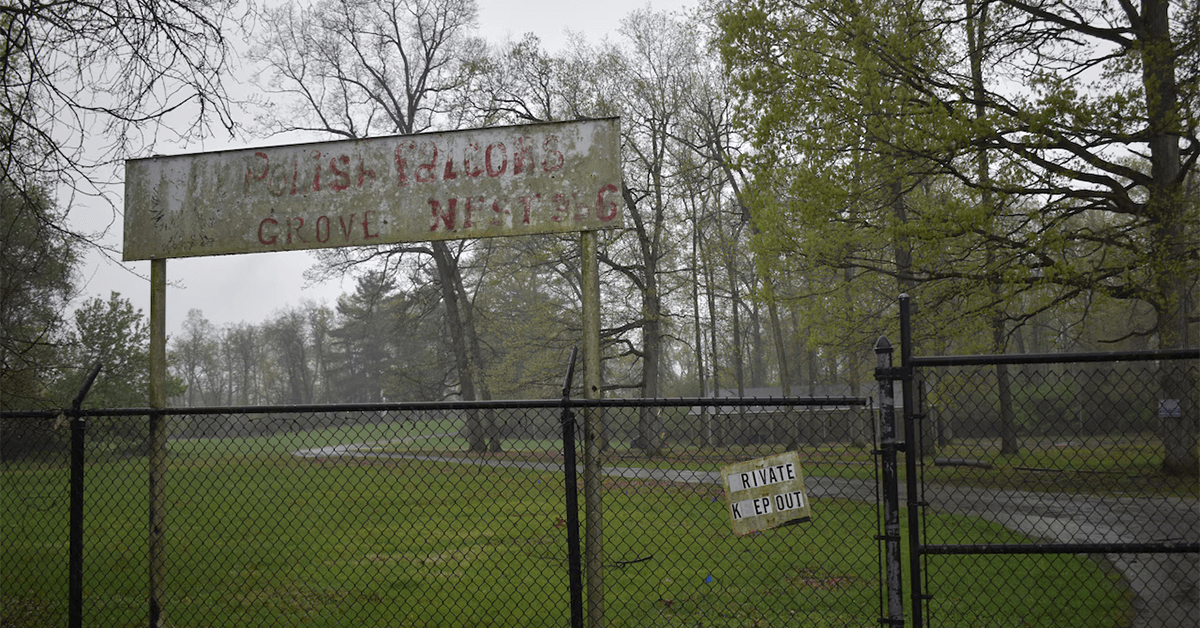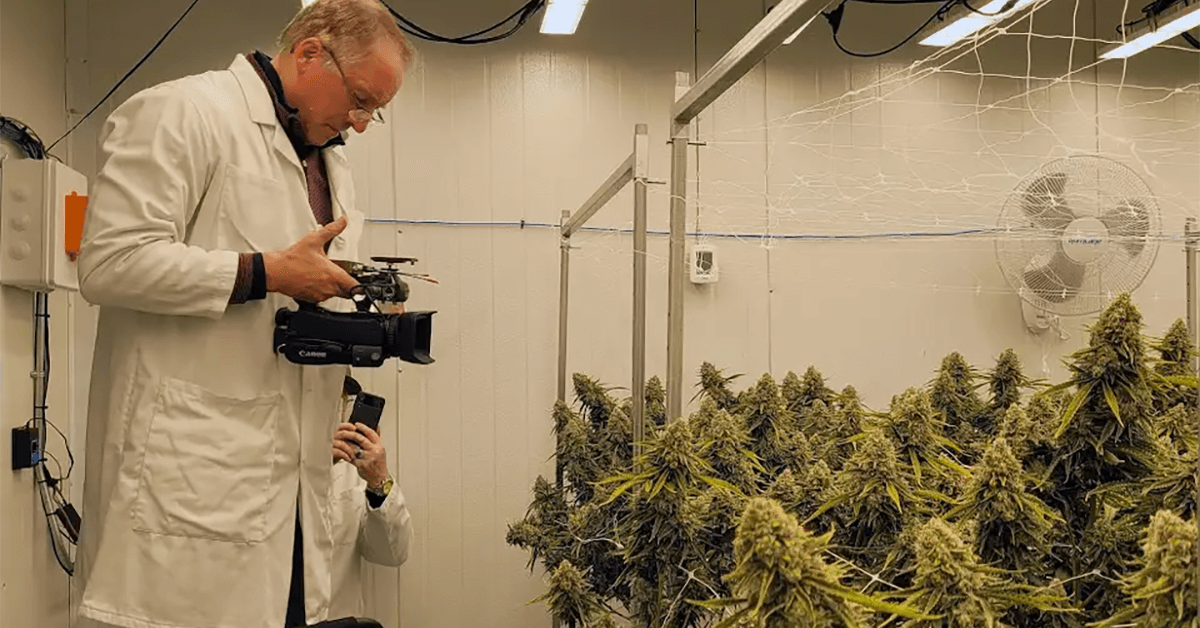Snoop Dogg's Tour Bus Makes Surprise Stop at Michigan Cannabis Dispensary

Rap legend Snoop Dogg made an unexpected stop in New Buffalo Township over the weekend, with his tour bus spotted outside a local cannabis dispensary on Michigan 239 on Saturday.
Dani Fellows, a receptionist at The Bloomery, recounted the event, stating that the tour bus, adorned with large images of the rap icon, arrived around 10 a.m. According to Fellows, a few individuals from the bus entered the dispensary, purchased several products, and left after about 20 minutes. "The Dogg Squad, they called them, came in and bought some pre-rolls and other items," Fellows said.
Fellows mentioned she took photos of the tour bus after her shift but did not see Snoop Dogg, who possibly stayed on the bus. Despite his absence, the bus itself drew significant attention, with many people stopping to take pictures.
"I think they said he was sleeping. He had a tour that night, and it seemed like a last-minute stop, likely for security reasons," she explained.
Fellows, a 31-year-old New Buffalo native now living in Weesaw Township, expressed her excitement at seeing the tour bus, especially as a fan of the rap legend. "It was thrilling. There are so many dispensaries, but the fact that they stopped here was pretty awesome," she said.
Snoop Dogg, born Calvin Cordozar Broadus Jr., emerged in the early 1990s and quickly became a notable figure in the rap scene, collaborating with influential artists like Dr. Dre. He is also well-known for his public persona, which prominently features his affinity for cannabis consumption.
Networking on the Greens: Michigan's Cannabis Golfers Swing into Summer

The Michigan Cannabis Golfers Association (CGA) is set to begin its fifth season with a series of exciting golf scrambles across various prestigious golf courses. This initiative, which commences on June 3rd at Orchard Hills Country Club in Buchanan, not only offers a unique networking opportunity for cannabis industry professionals but also aims to foster community engagement and challenge the existing cannabis stigmas.
Founded by Rick Anstiss, the CGA has grown into a significant platform for both cannabis enthusiasts and the general public. The association provides a welcoming environment where individuals can connect over golf, regardless of their cannabis consumption preferences. This year, apart from the inaugural event in Buchanan, additional scrambles are scheduled for June 22nd at Coldwater Country Club and September 28th at Indian Lake Hills in Eau Claire.
During a recent interview, Rick Anstiss discussed the evolution of these golf events from a simple annual outing known as the Hazy Holes Cannabis Classic to a broader networking platform under the CGA umbrella. He emphasized the inclusive nature of these gatherings, which are designed to cater to a diverse group of participants, including consumers, product developers, and dispensary owners. Golf courses that participate in these events also experience an increase in public engagement, which helps in gradually shifting perceptions about cannabis use on golf courses.
The CGA's events are not just about golf; they offer a comparative experience to traditional golf outings where alcohol might be involved. This approach helps in normalizing cannabis as part of recreational activities, much like a mild drink might be. Rick further explained that the association is still developing its membership structure, but the focus remains on providing valuable experiences through these golf events.
Each golf scramble allows for a wide participation range, attracting hundreds of golfers, including repeat attendees and newcomers from across the state. The events have been a melting pot, attracting various companies from different regions, including Detroit and Wayne. This diverse attendance not only boosts networking opportunities but also enhances exposure for local cannabis brands and laboratories, fostering a better understanding and cooperation among different stakeholders in the cannabis industry.
For those interested in joining the Michigan Cannabis Golfers Association's upcoming events or learning more about the membership details, information is available on their official website, CGAofficial.org, as well as on their social media platforms on Instagram and Facebook.
Cannabis Revenue to Fund Major Upgrades at Leoni Township Park

Leoni Township is poised to enhance recreational amenities through the strategic use of cannabis tax revenues, following the acquisition of over 50 acres on Round Lake. The land, previously owned by Polish Falcons Nest 336, was purchased with a vision of preserving its public utility, according to Leoni Township Manager Mike Jester. The township plans to introduce a variety of facilities including a swimming area, playground equipment, and sports fields, aimed at serving as a community hub for various activities like family gatherings and sports events.
This initiative is funded by the Marijuana Excise Tax, with Leoni Township allocating the proceeds towards public welfare projects. The township, which hosts the highest number of marijuana dispensaries in Jackson County, garnered more than $590,000 in cannabis tax revenue in 2023 alone. This financial strategy not only reflects a responsible fiscal approach but also a commitment to enhancing community life.
The proposed plans for the park are still in the formative stages, with potential additions like restrooms, baseball fields, and kayak rental services. Notably, the project also intends to introduce a swimming area in the township, addressing a recreational gap in the existing facilities at Michigan Center Lake.
However, the project has met with mixed reactions from the local community. Diane Miller, a long-time member of the Polish Falcons and a local resident, expressed concerns about restricted access to the land that once offered open entry for various nocturnal recreational activities. Additionally, some residents are apprehensive about the potential increase in traffic that the new amenities might attract.
Further details and updates on the park's development are expected to be discussed in upcoming township board meetings. Residents seeking more information are encouraged to visit the township's official website.
Mixed Reactions to Cannabis Dispensaries Across Michigan Communities

As Michigan's cannabis industry flourishes, it continues to provoke mixed reactions within communities, reflecting a complex landscape of economic benefits and societal concerns.
In Metro Detroit, from densely populated areas like Detroit to smaller communities such as Utica and Mount Clemens, the proliferation of cannabis dispensaries has sparked diverse opinions. In Macomb County, the growing number of dispensaries is advertised on numerous billboards, a sight that has not gone unnoticed by residents.
Jackie Rottmann, a local resident, expressed her dissatisfaction, noting, "I think it's really a bad thing. I don't think it's really something we need on every corner." This sentiment contrasts sharply with the views of others like Joyce Dixon from Mount Clemens, who sees the dispensaries as beneficial. "It feels like more business helps the community," Dixon stated.
Neighborhood responses vary significantly. In Clinton Township, community leaders have responded to public opinion by prohibiting dispensaries. "Residents of this community did not want and voted not to have any marijuana facility in the township so they can't buy it here," explained Bob Cannon, the township supervisor. This decision also extended to limiting billboard advertisements within the community.
In contrast, Detroit seems to embrace the economic opportunities presented by the cannabis industry. Councilwoman Mary Waters highlighted the positive impact of cannabis businesses in revitalizing buildings, creating jobs, and enhancing the local tax revenue. Waters emphasized the importance of strategic location planning for dispensaries to align with community values, particularly concerning proximity to schools and churches.
Noise and traffic issues are also part of the community feedback. Paul Gutleber, who lives adjacent to a dispensary, likened the situation to "a drag strip every day," pointing out the less desirable effects of having a dispensary nearby.
The state of Michigan now boasts over 700 retail cannabis stores, a number supported by industry advocates like Matthew Abel, who argues that the market should dictate the number of operational dispensaries. Abel cited significant financial contributions to local government coffers from licensing fees, with Detroit and Wayne County receiving substantial sums.
Despite the economic advantages, the sentiment is not universally positive. Rottmann acknowledges the job creation from the cannabis industry, which totals approximately 46,000 full-time positions in Michigan, but remains skeptical about the overall benefit to society, remarking on the omnipresence of cannabis advertising.
The dialogue around cannabis in Michigan showcases a balance between economic incentives and community values, underscoring the need for careful regulation and thoughtful integration of cannabis businesses into the fabric of local communities.
The Business and Science of Cannabis Explored in New Michigan Documentary

The evolving cannabis industry in Michigan is the focus of a new documentary, "Cannabusiness: Marijuana on Main Street," which explores the commercial and scientific aspects of cannabis cultivation in the state. Set to premiere on Delta College Public TV at 8 p.m. on Tuesday, April 23rd, the documentary was produced by Ron Beacom and Bob Przybylski, who have previously collaborated on other local projects. For those with a PBS Passport subscription, the 58-minute film is available for viewing immediately.
"Cannabusiness: Marijuana on Main Street" aims to provide a comprehensive view of the cannabis industry, balancing perspectives from both proponents and critics. "We're not saying we're in favor of it; we also hear from those who have concerns," Beacom explained, expressing his hope that viewers will find the documentary informative and balanced, shedding light on the complexities of the industry.
The documentary came about following the success of Beacom and Przybylski's previous film, "Breached," which focused on the dam breaches in May 2020. With roots in Midland and Bay City, the duo felt it was essential to highlight the recent developments in their communities and the broader region. Przybylski noted the accessibility and openness of industry insiders, which was initially unexpected. "We thought it was going to be hard to get people to talk with us," he said, "They were more than willing. They were really happy to talk with us."
Throughout the film, viewers are introduced to the business aspect of the cannabis industry, showcased during a conference at Soaring Eagle in Mount Pleasant, where Przybylski was struck by the prevalence of financial and legal advisors. He emphasized the significant economic impact, the scientific advancements in cultivation, and the growing employment opportunities within the local community. "I'm really proud of it," Przybylski remarked. "There's a lot of information, and I think people are going to be surprised about the amount of money involved, the science, but also about the employment opportunities that are getting into the community."
Michigan Community Reflects on Cannabis Acceptance During Weed Day Festivities

Residents of Midland County, Michigan, gathered in large numbers at local cannabis dispensaries this Saturday to mark the annual celebration of Weed Day, with long lines seen at both Emerald Fire Farms in Coleman and LaCannaville in Sanford. This event, steeped in tradition even before the legalization of recreational cannabis in Michigan in 2018, has become a significant local celebration.
Jazmyne Dulong of Farwell, celebrating her first Weed Day, shared that she turned to cannabis in the past year as a means to manage her anxiety, depression, and ADHD. "Cannabis brings people together," Dulong noted, reflecting on the increased societal acceptance and the packed scene at Emerald Fire Farms.
Similarly, Jason Pegorch of Coleman highlighted the sense of community the plant fosters, especially evident during such gatherings. Pegorch, along with other attendees, appreciated the giveaways and the festive atmosphere at the dispensaries. Emerald Fire Farms was celebrating its third Weed Day, while LaCannaville marked its first anniversary since opening on Weed Day the previous year.
The sentiment that Weed Day has long been a holiday was echoed by several attendees, including Gage White of Sanford, who reminisced about times spent with friends enjoying cannabis even before its legal status. Dan Fenskie of Houghton Lake celebrated the legalization, recalling the days when he had to conceal his use of marijuana. "It's great they legalized it," Fenskie said, commenting on the overwhelming prevalence of cannabis use globally.
The legalization, according to Anthony Nelson of Sanford, has not only made cannabis more accessible but has also ensured the regulation of its quality, alleviating concerns about impurities or harmful additives which were common fears in the pre-legalization era.
The therapeutic benefits of cannabis were a common thread among discussions, with individuals citing relief from various medical conditions such as Parkinson's disease, chronic pain, bipolar disorder, and more. Dave Madison of Saginaw shared how cannabis has helped manage his Parkinson's symptoms more effectively than traditional pain medications.
Despite the festive and communal atmosphere, some attendees acknowledged the persistent skepticism and stigma surrounding cannabis use. Ted Provost of Sanford pointed out that not everyone has embraced the legalization and use of cannabis. However, many, like Penny Johnson of Sanford, believe that acceptance has significantly grown, viewing cannabis through a more open and informed lens.
As the community continues to navigate the evolving perspectives on cannabis, events like Weed Day play a crucial role in fostering dialogue and dispelling long-held misconceptions, paving the way for a more inclusive understanding of cannabis use both recreationally and medicinally.


 Helpful Links
Helpful Links